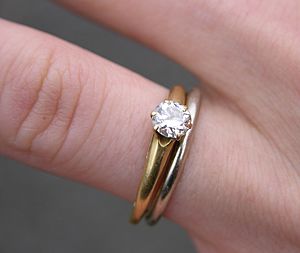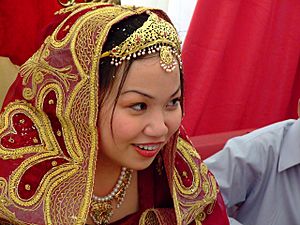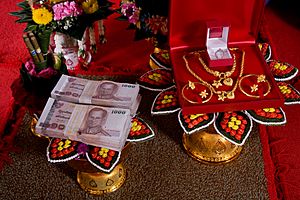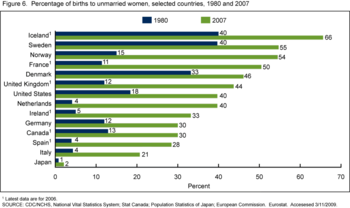Wife facts for kids

A wife is a woman who is in a marriage. When a woman gets married, she becomes a wife. Even if a couple separates, the woman is still considered a wife until their marriage is officially ended by a divorce. If her partner passes away, she is then called a widow. What a wife is expected to do for her partner, and her place in society and the law, can be very different depending on the culture and how times have changed.
Contents
What Does "Wife" Mean?

The word "wife" comes from an old Germanic word, wībam, which simply meant "woman." In Old English, it was wīf, meaning "woman or wife." You can still see this older meaning in words like "midwife" (a woman who helps with childbirth) or "goodwife" (an old term for the lady of the house).
Changes After Marriage
In many cultures, when a woman gets married, she often takes her husband's last name. However, this isn't true everywhere.
Married women often show their marital status in different ways. In many Western countries, a married woman usually wears a wedding ring. In other cultures, there might be other special signs.
A married woman is often called "Mrs" (pronounced "Missus"). But some married women prefer to be called "Ms" (pronounced "Miz"), which is also used when you don't know if a woman is married or not.
Words We Use for Wives

On her wedding day, a woman is called a bride. After the wedding, she becomes a wife. Her partner is called the bridegroom during the wedding and then her husband after they are married.
In some older traditions, like those followed by the Roman Catholic faith, a woman is called a "bride" until she actually says "I do" and exchanges vows. After that moment, even if the ceremony is still going on, she is considered a wife. The couple is then called "newlyweds" or the "newlywed couple."
The word "wife" describes a woman's special relationship with her spouse. It's different from "mother," which describes her relationship with her children.
Sometimes, a woman in a long-term relationship that isn't a formal marriage might be called a "common law wife." This means they live together like a married couple, even without a legal ceremony. Some people prefer to use the word "spouse" for both partners in a marriage to be more gender-neutral. Many countries are changing their laws to use "spouse" instead of "wife" and "husband."
If a woman's husband has passed away, she is called a widow.
When a Woman is No Longer a Wife
A woman stops being a wife if her marriage ends. This can happen in a few ways:
- Divorce: This is when a marriage is legally ended. After a divorce, a woman is often called a "former wife" or "ex-wife."
- Annulment: This is different from divorce. An annulment means that the marriage is treated as if it never happened at all.
- Death of a Spouse: If her husband dies, she becomes a widow.
The way society treats widows can be very different depending on the culture.
Legal Rights of Wives
For a long time, the legal rights of wives were very different from those of husbands. Historically, men often had more control over things like family property, what happened to children, and who inherited things.
However, in the 20th century, many countries started to change their laws to give wives and husbands equal rights. Countries like Switzerland, Greece, Spain, and France made big changes in the 1980s to ensure full gender equality in marriage.
Even today, in some parts of the world, husbands still have more legal authority in marriage. For example, in Iran, the law states that the husband is the head of the family.
Money and Gifts in Marriage

In some cultures, special payments or exchanges happen when people get married:
- A dowry is money or property that the bride or her family gives to the husband.
- A bride price is money or property that the husband or his family pays to the bride's family.
- A dower is money or property that the husband gives to his wife.
The purpose of a dowry has changed over time. Sometimes, it was meant to help the new couple start their life together. In some cases, it was a way to protect the wife: if the husband treated her badly, he might have to return the dowry to her or her family.
Today, dowries are still common in parts of South Asia, like India and Pakistan. Sadly, sometimes arguments over dowry payments can lead to violence.
Changing Names After Marriage
In many English-speaking countries, wives often change their last names to their husband's name after marriage. This tradition has a long history.
Some people think this practice is old-fashioned because it comes from a time when wives had fewer rights. Others see it as a personal choice and a harmless tradition. Some countries have even made laws about it. For example, since 1983, women in Greece are required to keep their birth names for their whole lives after marriage.
Wives and Children
Traditionally, and still in many cultures, a wife's role was strongly connected to being a mother. There was a strong expectation that wives would have children.
However, these ideas have changed in many parts of the world. It's now more common for children to be born to parents who are not married in many countries.
While some wives, especially in Western countries, choose not to have children, this choice is not accepted everywhere. In some places, like northern Ghana, paying a bride price means the woman is expected to have children. Also, some religions believe that having children is a requirement in marriage.
Many traditions, like dowries and bride prices, have been around for a very long time. The exchange of gifts or money goes back to ancient times. Wedding rings have also always been used as a symbol of faithfulness between two people.
Images for kids
-
16th-century Samurai Toyotomi Hideyoshi sitting with his wives and concubines.
-
King Solomon with 3 of his many wives. Illustrated in 1668 by Giovanni Venanzi di Pesaro.
See also
 In Spanish: Esponsales para niños
In Spanish: Esponsales para niños
- Bride kidnapping
- Wife selling
 | Isaac Myers |
 | D. Hamilton Jackson |
 | A. Philip Randolph |





